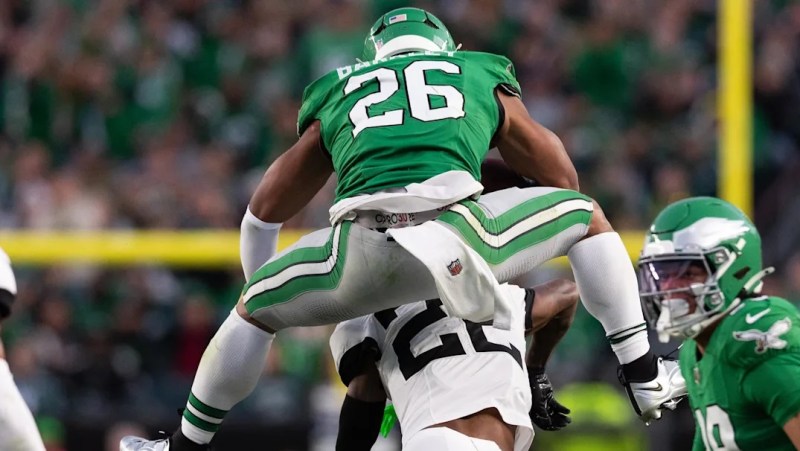The NFL’s reputation for drug testing players after standout individual performances led to a lighthearted moment in the Philadelphia Eagles locker room on Sunday. After running back Saquon Barkley put up a career-high 255 yards in the Eagles’ win over the Los Angeles Rams, the MVP candidate returned to the locker room to find a drug-testing notice at his stall.
However, this was not an official request from the NFL—it was a prank set up by tight end Dallas Goedert.
Laughing at the situation, Barkley told reporters, “That’s not me. I’ve been drug tested enough.” He wasn’t joking, as Barkley has been no stranger to testing in recent times.
Following an impressive game against his former team, the New York Giants, where Barkley hurdled a defender backwards en route to a 176-yard day, the NFL responded by having him drug tested immediately after the victory. Barkley mentioned the incident on the podcast “Air It Out,” saying, “I got drug tested right after the game.”
Other NFL players have expressed similar frustrations, alleging that the league’s supposedly random drug tests aren’t as random as they claim. Barkley’s Eagles teammate, wide receiver A.J. Brown, spoke out in 2022 after he was selected for testing following a three-touchdown performance. “Rogerrrrr this is not random,” Brown wrote on X (formerly Twitter), referencing NFL Commissioner Roger Goodell.
An NFL spokesperson did not directly respond to Brown’s accusations but instead reiterated the league’s drug-testing policy, which was collectively bargained with the NFL Players Association. “Neither the union nor the NFL is involved in the random selection process, as it is run by an Independent Administrator who uses a computer program,” said NFL spokesperson Brian McCarthy to DailyMail.com.
According to the NFL’s drug-testing policy, 10 players from each team are randomly selected by a computer each week to be screened for performance-enhancing drugs (PEDs). The league conducts approximately 18,000 PED tests during each preseason and regular season, most of which are random.
Additionally, around 8,000 PED tests are conducted under the “Reasonable Cause” testing program for players with a history of positive tests or credible evidence of steroid use.
RELATED: ‘Madden 25’ Introduces Saquon Barkley’s Incredible Backwards Hurdle to Gameplay
Despite the league’s assurances, many players remain skeptical about how truly random the process is. Multiple players have voiced suspicions that they were tested due to their on-field performances.
In 2019, former Cleveland Browns receiver Odell Beckham Jr. claimed that he was being targeted by the league’s testing policy. “[The NFL] made me come in Monday when we had an off day,” Beckham told Cleveland.com. “Had a drug test. Made me come in Thursday after the game. Had another drug test. Nobody is getting tested like me. I know people who didn’t get tested for five months in the offseason, and I’m getting tested every time.”
Cleveland Browns defensive end Myles Garrett also voiced his frustrations, alleging that he was subjected to drug testing after showcasing his muscular arms during two 2021 games. “I go sleeveless TWO TIMES and get ‘randomly’ drug tested BOTH times,” Garrett tweeted. “I’d try 3 for 3, but they can miss me with the blood draw—definitely not the vibe. #SleevelessMyles is retired.”
Former San Francisco 49ers safety Eric Reid was another player who felt targeted by the league’s drug-testing practices. Reid had joined his then-teammate Colin Kaepernick in kneeling during the national anthem throughout the 2016 season, protesting police brutality and racial injustice.
After filing a grievance against the league—alleging that NFL owners had blackballed him due to the protests—Reid signed with the Carolina Panthers in 2018. He then claimed that he was drug tested seven times in just 11 weeks.
“I’ve been here 11 weeks; I’ve been drug-tested seven times,” Reid told reporters. “That has to be statistically impossible. I’m not a mathematician, but there’s no way that’s random.” According to Yahoo Sports’ analysis, Reid had just a 1-in-588 chance, or a 0.17 percent probability, of being selected that frequently given the NFL’s testing guidelines.

Ultimately, a joint investigation by the NFL and the NFL Players Association concluded that Reid was not unfairly targeted by the drug-testing program. However, the perception of biased testing remains widespread among players.
Eric Reid’s activism began when he became one of the first NFL players to kneel alongside Kaepernick during the national anthem in 2016 to protest social injustices, an action that thrust him into the spotlight.
His accusations of frequent testing, combined with similar claims by other players, have continued to cast a shadow of doubt over the league’s testing process.
As for Saquon Barkley, he continues to prove himself on the field, making significant contributions to the Eagles’ success.
But as long as dazzling performances are followed by drug-testing notices—real or fake—it seems the debate over the NFL’s testing policies is far from over.







